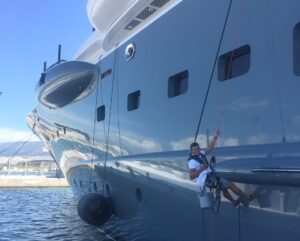Relationships in yachting: Can we expect crew to stay single?

Life as a crew member onboard a yacht – long stretches at sea, working long hours, and living in close quarters – doesn’t exactly make it easy to start or maintain a relationship. It’s hard to get time to yourselves or any privacy, in an environment where having a conversation without listening ears is tricky at the best of times.
We often get asked by crew whether boats accept couples, and while some do, many yachts we speak to have concerns about employing couples or even a candidate who is in a relationship, regardless of them wanting to work together or not.
Many vessels tell us they are only considering singles, as they don’t want crew to be distracted. But can we really expect or ask of a person to be single, and only focus on their career from their early 20s to mid-30s?
There are valid concerns on both sides and there is no easy ‘one-size-fits-all’ answer. Here, we take a deeper dive into the issue and invite you to share your thoughts in our survey on this topic.

While many people prioritise their careers, especially in demanding fields like yachting, expecting crew to remain single for years raises some tricky questions.
Think about a crew member with a permanent position and 40 days of leave a year. Is it realistic to expect them to spend months away from their partner? Even for those partners who are both on rotation, it may not necessarily make it easier, if their cycles don’t match up.
Interestingly, we have seen that yachts that are open to couples often have a bigger pool of qualified candidates to choose from. Even if there isn’t a position for both partners right away, just knowing the yacht is open to it can be a big plus for crew looking for a long-term position.
For vessels, there are a range of concerns when it comes to employing couples together.
There’s a worry that if one partner leaves, the other will likely follow, potentially leaving the vessel short-staffed. Relationship difficulties between partners can also affect the whole crew, creating an uncomfortable atmosphere. Too much affection in the crew mess might make the other crew uncomfortable. And, some worry that couples might isolate themselves from other crew members, hindering team cohesion and morale.
These are valid concerns. Maintaining a professional and harmonious onboard environment is crucial. But is it really fair to expect crew members, often in their prime years for finding love, to put their personal lives on hold?

While concerns about couples onboard are understandable, there are also potential advantages.
As we’ve already said, yachts that are open to couples or those in relationships are often able to choose from a wider pool of candidates. A couple who works well together can also set a positive example and strengthen teamwork among the rest of the crew.
Couples may actually bring increased stability to a yacht. If they are happy and comfortable in their position and in their relationship, and they feel supported by the vessel, they could be more likely to stay in a position longer, reducing crew turnover. In turn, knowing that relationships are supported by the vessel could boost overall crew morale and wellbeing.
Every relationship is different, and yachts and agencies need to assess each couple or individual in a relationship on their own merits. Factors to consider might include the strength and maturity of the relationship, each person’s professional history and goals, and whether they have successfully worked together before.
It’s essential to avoid making assumptions based solely on relationship status and instead focus on open communication and individual evaluation.
Crew agencies often play a key role in navigating these tricky situations. By building strong relationships with candidates, agencies get a good understanding of their personal lives, goals, and relationship situations.
At The Crew Hunter, we nurture yachting talent, often over many years. “I’ve mentored many crew members throughout their careers,” says Jenny, our Head of Recruitment. “I enjoy speaking with our crew members, getting to know them a little bit, their background, finding out their reasons why they are in this industry, their long term and short term goals, what they ideally are looking for as an individual or as a couple, and by listening to them. From the information they share, I assist them in their search for a role in this jungle of yachts, finding them a role that they would enjoy and thrive in, on a vessel that they really would like to work on.
“I like to see us as mentors for the crew, a safe place for them to openly and honestly share their thoughts. I have empathy for them, I have been there, I have been a crew member so I do understand what their thoughts and sometimes concerns are. I care about where they go next and I do care for them to be happy and content with their decisions.”
The question of relationships in yachting is an ongoing conversation. Finding the balance between what the vessel needs and the wellbeing of the crew is a tough job.
What are your thoughts? From Captain to junior Stew, we want to hear from you.